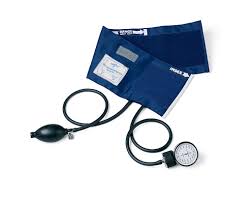I have included a blood pressure cuff, also known as an Aneroid Sphygmomanometer in my medical supplies. Now I have had people tell me that this is not something that should be included unless you have had medical training. They argue that it will be useless to the average person.
However, I disagree a blood pressure cuff can be handy in many ways. If you have people in your group that have high blood pressure this can help you monitor them and determine whether exercise, diet or alternate medicines are helping them. Extra medical gear is always good to have, even if you don’t know how to use it. Medically trained people may be available that do not have access to medical equipment.
I would suggest that you get a manual blood pressure cuff and stethoscope. The manual cuffs are extremely accurate, with a minimum of training, they are easy to use and never require batteries. You do need to have a stethoscope.
Normal blood pressure can vary with age, condition and genetics. The following should be a good guide to help you determine what is normal.
| top number (systolic) in mm Hg | Bottom number (diastolic) in mm Hg | Your category |
| Below 120 | and Below 80 | Normal blood pressure |
| Between 120-139 | or Between 80-89 | Prehypertension |
| Between 140-159 | or Between 90-99 | Stage 1 hypertension |
| 160 or higher | or 100 or higher | Stage 2 hypertension |
Blood pressure cuffs come in sizes
You may need to get more than one cuff. Recently I was present when an older overweight person had heart problems at a social activity. Several experienced medical people were on the scene, but had no equipment with them. Having a first aid kit with me, I loaned one of them my blood pressure cuff. Much to my surprise it would not fit, their arm was too large. They needed an extra large cuff. Prior to this incident, I did not know they came in sizes. So if you have someone in your family or group that is unusually large or small you may want to check it out and make sure your cuff will fit.
A good list of medical supplies you should have on hand. An Updated List of Medical Supplies
Howard


Very good advice. They are very affordable. You don’t have to be an expert for them to be useful. Just like you don’t have to be a certified mechanic to know if the air pressure in your tires is too high or too low that it may cause problems.
The life it saves might be your own. Ours probably saved mine 2 weeks ago. I woke up with massive chest pains. Checked my blood pressure and it was 173/113. I took my meds and when it didn’t come down, we knew I had to go to the ER. I spent the next 2 days in the hospital.
They told me that my being able to check my own BP probably saved my life!! They didn’t say “Hey, you’re not a doctor!” Actually they congratulated me for my quick thinking and being well prepared.
EMTs sometimes use a BP cuff in the field as a device to reduce bleeding in a limb…..arm or leg.
Not exactly a tourniquet, but close. Just pump it up until bleeding slows or stops. Then monitor it until at more definitive care.